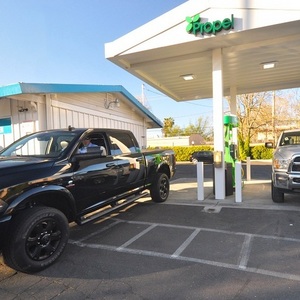Propel launches North America's first retail rollout of Neste HPR

Photo: Propel Fuels
March 18, 2015
BY Propel Fuels
Propel Fuels has launched California’s most advanced diesel fuel: Diesel HPR (High Performance Renewable) at Propel locations across Northern California. Propel’s Diesel HPR consists of 98.5 percent Neste Oil's NEXBTL renewable diesel, a low-carbon renewable fuel that meets petroleum diesel specifications for use in diesel engines while realizing the benefits of better performance and lower emissions.
Diesel HPR will be available at 18 Propel locations in Sacramento, San Jose, East Bay, Redwood City and Fresno. Locations, directions and real time pricing can be found on Propel’s mobile app available in the Android and Apple app stores. A complete list of locations is also available at dieselhpr.com/locations.
“Diesel HPR exceeds conventional diesel in power, performance and value,” said Rob Elam, CEO and co-founder of Propel. “Propel is committed to offering Californians the most advanced low carbon fuels that meet our high standards for quality and value.”
Advertisement
Incorporating diesel refined from renewable biomass through Neste Oil’s advanced hydrotreating technology called NEXBTL, Diesel HPR meets the toughest specifications required by automotive and engine manufacturers, enabling the fuel to be used by any diesel vehicle. Diesel HPR is designated as ASTM D975, the standard for all ultra-low sulfur diesel fuel in the U.S., and is recognized as “CARB diesel” by the California Air Resources Board. Diesel HPR provides increased engine power and torque, as well as significant reduction in harmful tailpipe emissions, NOx emissions and particulates (PM).
“This renewable diesel joins a growing suite of new, cleaner transportation fuels in California thanks to our low carbon fuel standard and forward-thinking companies like Propel,” said California Air Resources Board Chairman Mary D. Nichols.
“We are pleased to see the introduction of a low carbon fuel at California retail fueling stations,” said Tim Olson, energy resources manager for the California Energy Commission. “Our state needs several options to reduce greenhouse gas emissions in the transportation sector and this cooperation between Propel Fuels and Neste Oil provides a tremendous opportunity to de-carbonize diesel fuel and help achieve our climate change goals.”
Advertisement
According to the U.S. DOE’s Alternative Fuels Data Center, renewable diesel’s high combustion quality results in similar or better vehicle performance compared to conventional diesel, while California Air Resources Board studies show that renewable diesel can reach up to 70 percent greenhouse gas reduction compared to petroleum diesel.
“As California continues to lead the world in clean fuels, we need to insure that the benefits are shared by everyone,” said Bill Magavern, policy director for the Coalition for Clean Air. “Renewable diesel provides significant immediate reductions in emissions that damage our health and change our climate, providing lasting health benefits for the disadvantaged communities that currently suffer the most from petroleum diesel pollution.”
“We congratulate Propel Fuels on their initiative to introduce Diesel HPR to consumers in California and are excited to be their supplier of choice with our NEXBTL renewable diesel,” said Kaisa Hietala, Neste Oil's executive vice president of renewable products business area. “NEXBTL renewable diesel reduces emissions as well as enhances engine performance leading to lower maintenance and service costs. It also has excellent low-temperature properties, which result in better vehicle reliability during the winter.”
Related Stories
Avfuel Corp., the leading independent supplier of aviation fuel and services, is expanding its sustainable aviation fuel (SAF) footprint with the addition of a new, strategic supply point in Denver, Colorado—the first of its kind in the region.
ATOBA Energy and Air Moana are partnering to implement scalable solutions for the supply of SAF. The collaboration aims to ensure long-term SAF availability while supporting local initiatives to develop sustainable fuel production in Tahiti.
Kintetsu World Express Inc. has signed an additional agreement with Hong Kong, China-based Cathay Pacific Airways for the use of sustainable aviation fuel (SAF). The agreement expands a three-year partnership between the two companies.
Broco Energy on July 17 announced a new partnership with the Massachusetts Port Authority (Massport) to deliver and transition Massport's fuel tanks to renewable diesel across its various facilities.
Shell Aviation, Accenture, and Amex GBT on July 10 announced Avelia is in the process of evolving to an industry solution with independent data hosting and a multi-supplier model helping users access the GHG benefits of SAF.
Upcoming Events










